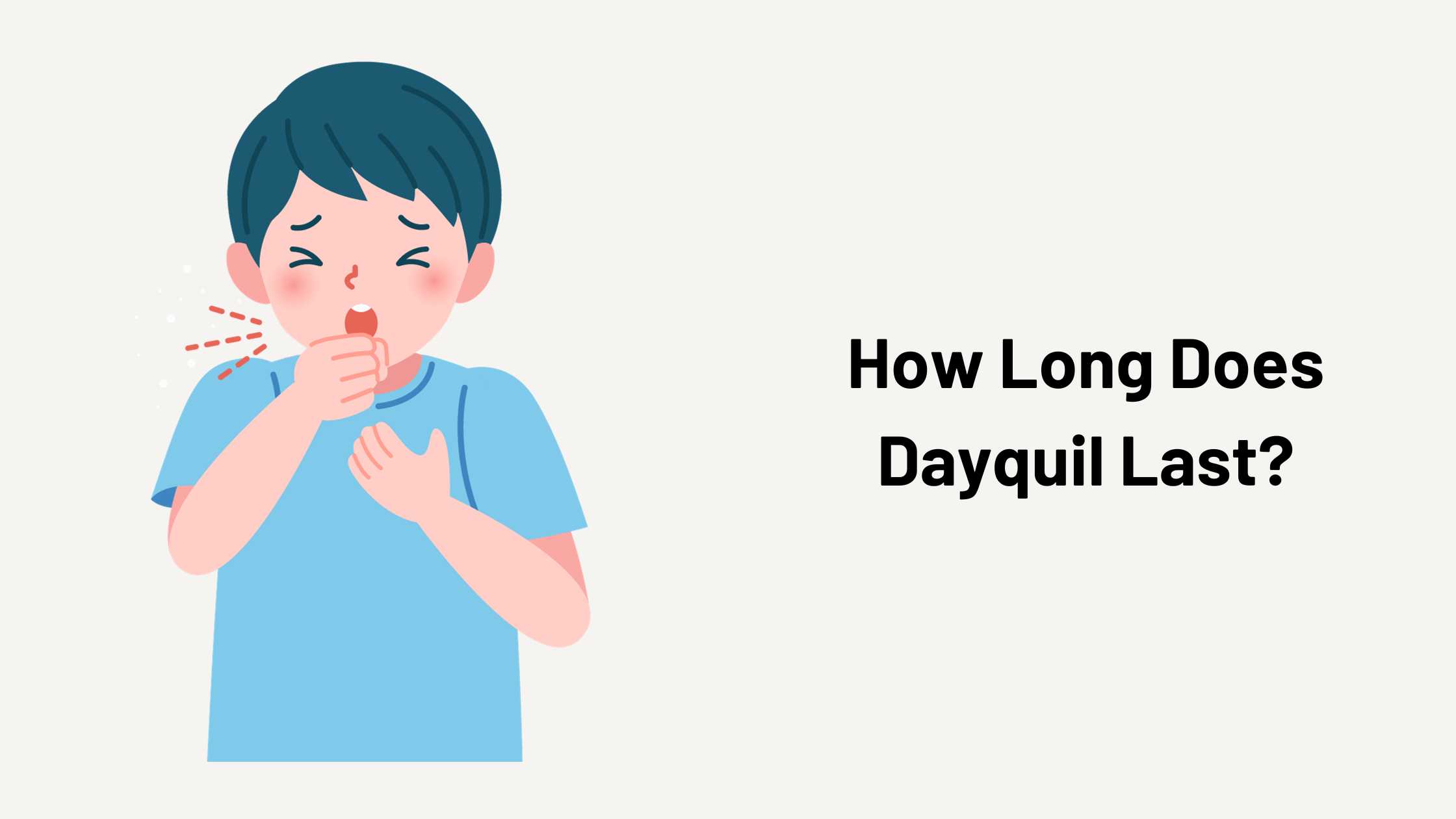
How Long Does Dayquil Last?
Most common over-the-counter medication DayQuil’s ability to reduce cold and flu symptoms is well established. It’s commonly given to help people resume their normal activities by lowering fever, sore throat, cough, and congestion. However, many people are interested in learning how long DayQuil stays active in their system. In this lengthy essay, we’ll go over DayQuil’s half-life, duration, and frequently asked questions. One medicine that is often used is DayQuil.
DayQuil Cough products provide up to eight hours of relief from cough symptoms.
What Is the Duration of DayQuil?
DayQuil’s duration of action varies from person to person and is contingent upon a number of factors, such as the person’s metabolism, the particular formulation of DayQuil, and the dosage administered. The benefits of DayQuil usually continue for four to six hours.
This indicates that it helps people feel better for a brief period of time by temporarily relieving cold and flu symptoms.
Unlike its nocturnal brother, NyQuil, DayQuil is meant to be used throughout the day because it doesn’t contain any substances that make you feel sleepy. Consequently, it’s critical to adhere to the suggested dosage guidelines provided on the product’s label because taking it too frequently or in excess can have negative effects.
How much time does your system retain DayQuil?
DayQuil may take 4 to 6 hours to start working, but it may take longer for the drug to become noticeable in your system. DayQuil’s duration in your system can be influenced by a number of variables, such as the product’s particular components, your metabolism as well and how often you take it.
Particular Components of DayQuil
DayQuil is a concoction of potent chemicals that work to reduce the symptoms of the flu and cold. DayQuil’s main active components are as follows:
Acetaminophen: A fever reducer and pain reliever.
Dextromethorphan: A suppressant for coughing.
Phenylephrine: A decongestant for the nose.
The body metabolizes and excretes these compounds at varying speeds. Dextromethorphan and phenylephrine are normally removed more quickly than acetaminophen, which is normally metabolized by the liver and expelled in the urine.
Metabolic Rate and Personal Factors
The rate at which your body breaks down and gets rid of drugs like DayQuil depends greatly on your metabolism. Your metabolism can be impacted by a number of factors, such as age, general health, heredity, and the presence of additional drugs or chemicals in your body.
Individual differences in metabolism, so each person’s experience with DayQuil’s stay in your system may be unique. It might go away more quickly in some situations, but it might stay around longer in others.
The Dosage and Frequency
How long DayQuil remains in your system might also be affected by how often and how much you take of it. DayQuil should be taken as prescribed, which is usually every 4 to 6 hours, to prevent the active components from building up in your body. On the other hand, taking DayQuil more often or at higher doses than advised may lengthen its half-life in your body.
Drug Examinations
It’s crucial to remember that DayQuil is not usually tested for in conventional drug tests if you’re worried about it turning up on one.
Substances like illicit drugs, prescription pharmaceuticals, and particular banned substances are frequently searched for in drug testing. However, you can always ask the organization doing the drug test for clarification if you have any questions.
Half-Life of DayQuil
The amount of time it takes for half of a drug to leave the body is known as its half-life. It’s a crucial metric for knowing how long a drug or its active components stay in your body.
The following are the precise half-lives of the active components in DayQuil:
Acetaminophen: In humans, acetaminophen usually has a half-life of two to three hours. This indicates that the elimination of half of the acetaminophen from your system takes, on average, two to three hours.
The half-life of dextromethorphan in adults is about two to four hours. By then, half of the dextromethorphan in your body should have been broken down and removed.
During an adult’s lifetime, phenylephrine’s half-life is comparatively shorter, lasting roughly 2.5 to 3 hours.
These half-lives give you a rough sense of how long it takes your body to process each of DayQuil’s active ingredients. Remember that the liver and kidneys are the organs that process and eliminate the drug, so if you have decreased function in these areas, the elimination process may take longer.
How Long Does DayQuil Last?

How Long Does DayQuil Last?
As was previously noted, DayQuil’s effects usually persist for four to six hours. This implies that DayQuil’s ability to relieve cold and flu symptoms should
fade at the period of time. You might feel like your symptoms—such as congestion, coughing, sore throat, or fever—return when the medication wears off.
To make sure that you continue to feel better throughout the day, it’s crucial to follow the suggested dosage schedule listed on the product’s label. Overusing DayQuil can raise your risk of adverse effects and lead to a buildup of the medication’s active ingredients in your body.
Answers to Common Questions (FAQs)
Does DayQuil have any adverse effects?
Yes, DayQuil can have adverse effects just like any other medication. Symptoms that are frequently experienced include nausea, anxiety, dizziness, and trouble sleeping. Although they are uncommon, allergic reactions and extreme dizziness might have serious adverse effects. If you encounter serious or enduring adverse effects, consult a physician.
Is it okay to take DayQuil along with other drugs?
When taking DayQuil with other medications, caution is necessary, particularly if the active components in the prescriptions are identical. An overdose may result from taking many drugs that contain the same active component. Always read the labels, and if you are unsure about possible interactions, speak with a healthcare practitioner.
Is it okay to consume alcohol when taking DayQuil?
Generally speaking, drinking alcohol while taking DayQuil is not advised. Alcohol may interfere with the medication’s effectiveness and cause negative side effects like sleepiness and vertigo. It is recommended that you abstain from alcohol while using DayQuil.
Can someone with specific medical issues use DayQuil safely?
If you suffer from certain illnesses, For conditions including high blood pressure, diabetes, thyroid problems, or liver or kidney problems, it’s crucial to speak with a doctor before taking DayQuil. Your healthcare practitioner can offer advice on other options if certain chemicals in the prescription are not appropriate for people with these illnesses.
Can DayQuil make me reliant on it?
When used according to instructions, DayQuil is not thought to be addictive or habit-forming. However, as the drug may be used to treat symptoms or produce a euphoric effect, misuse or overuse of it can result in dependency. It is important to use DayQuil as directed by the manufacturer and in a responsible manner.
Can I use DayQuil while I’m expecting a child?
Being pregnant is a period when expectant moms put their unborn child’s health first, thus they should exercise caution and uncertainty. One typical concern that comes up when it comes to treating symptoms like the flu or colds is: Can I use DayQuil when I’m pregnant? DayQuil is an over-the-counter drug that is frequently used to treat symptoms during illness, but doctors are still divided on whether or not it is safe to take while pregnant.
The active components in DayQuil include phenylephrine, dextromethorphan, and acetaminophen. When taken at the authorized dosages, acetaminophen is usually thought to be safe for pregnant women, but it’s crucial to avoid taking more than that. Many medical professionals consider dextromethorphan, which soothes coughing, to be safe for use during pregnancy.
What are the DayQuil side effects?

DayQuil side effects
An over-the-counter drug called DayQuil is frequently used to treat cold and flu symptoms. Like any medication, it can have negative effects even though it is mostly safe when taken as prescribed. The following is a detailed list of some possible DayQuil side effects, organized into bullet points:
Dizziness: When using DayQuil, some people may feel mildly lightheaded or dizzy.
Anxiety: DayQuil’s active components have the potential to activate the nervous system, which in certain users may cause restlessness or anxiety.
Nausea: Occasionally, nausea may coexist with an upset stomach as a potential side effect.
Difficulty Sleeping: DayQuil may make it difficult for some people to fall asleep or stay asleep because of the stimulating effects of certain of its ingredients.
Common side effects
Dry Mouth: A less frequent side effect that can cause discomfort or a thirst sensation is dry mouth.
Headache: While using DayQuil, some people may have mild to moderate headaches.
Palpitations: Occasionally, the stimulating effects of DayQuil’s active components may cause a speeding heartbeat or palpitations in the heart.
Dangerous Side Effects:
Although it is uncommon, DayQuil may have more serious adverse effects, such as:
Allergic Reactions: People may occasionally develop an allergy to one or more of DayQuil’s ingredients. An allergic response may cause hives, itching, facial, lip, tongue, or throat swelling, as well as extreme dizziness and breathing difficulties.
Severe Dizziness or Fainting: DayQuil occasionally causes extremely dizzy spells, which could lead to
when passing out or falling.
Acetaminophen, an ingredient in DayQuil, has the potential to harm the liver when used excessively or over an extended period of time. Liver dysfunction symptoms might include jaundice, which is a yellowing of the skin or eyes, dark urine, pain in the abdomen, or excessive fatigue.
High Blood Pressure: One of DayQuil’s active ingredients, phenylephrine, has the potential to raise certain people’s blood pressure. The likelihood of this happening is higher in people who already have high blood pressure.
Uneven Heartbeat: Rarely, phenylephrine can also cause arrhythmias or irregular heartbeats.
It’s important to keep in mind that while DayQuil can have these side effects, not everyone will have them, and many people use the medication for years without experiencing any negative side effects. It is advised that you report any severe or enduring side effects.
Stop taking the medicine and get medical help right away
In order to be sure DayQuil is safe for you and won’t worsen any current health issues or interact poorly with other medicines, it’s also crucial to speak with a healthcare provider before using it if you have any pre-existing medical disorders or are taking other prescriptions.
How to use DayQuil?
An over-the-counter drug called DayQuil is frequently used to treat cold and flu symptoms. Since it comes in different formulations, it’s critical to read the label of the particular product you’re using and adhere to the recommended dosage. An overview of using DayQuil can be found below:
1. Read the label first
Read the product label carefully before using DayQuil. DayQuil formulations can differ in terms of the active components and dosage guidelines.
2. Look for Any Safety Measures
Pay close attention to any cautions or warnings that are stated on the label. Make sure DayQuil is appropriate for your needs and won’t adversely affect any other medications you use or any underlying medical concerns you may have.
3. Instructions for Dosage
Ascertain the suggested dosage for the particular DayQuil product you have and your age. Products made by DayQuil may be liquid, capsule, or gelcap-shaped. Doses are commonly given as tablets or capsules or in milliliters (mL).
Don’t take DayQuil more often than indicated by the label, nor should you take it in excess of the authorized dosage. Abuse of the drug excessively may result in negative effects and health hazards.
4. Consume food or not
Generally speaking, DayQuil can be taken with or without food. On the other hand, you can decide to take it with a little meal if taking it on an empty stomach causes you to have an upset stomach.
Measuring Liquid Formulations in
5. Use the included dosage cup
If you’re using DayQuil in liquid form, or a measuring tool of medical quality to guarantee precise readings. A typical kitchen spoon might not give accurate measures, so avoid using one.
6. Take the medication by mouth
Completely swallow the liquid, pill, or gelcap. The gel caps or capsules should not be broken, chewed, or crushed. You might try taking the drug with a glass of water if you have trouble swallowing.
7. Timing
Unlike its overnight sibling, NyQuil, DayQuil does not induce sleepiness, hence it is usually used during the day. Adhere to the dose regimen specified on the label when using DayQuil during the day. DayQuil’s effects typically last between four and six hours, so it’s crucial to spread out your dosages appropriately.
8. Consume Water
It’s crucial to be properly hydrated when you’ve got the flu or a cold. Drink lots of liquids to keep your body hydrated and promote faster healing, such as water, herbal tea, or clear broths.
9. Recuperation and Rest
Even though DayQuil can help with symptoms, it’s still important to get enough sleep and give your body time to heal. To aid with your recuperation, stay away from physically demanding activities, get enough sleep, and eat a healthy diet.
10. Proceed As You See Fit
As instructed by the manufacturer, keep taking DayQuil until your symptoms subside. Avoid stopping the drug suddenly as this may cause your symptoms to recur.
See a healthcare provider for help if your symptoms worsen or continue, or if you have serious adverse effects proficiently. Additionally, before using DayQuil, speak with your healthcare professional if you have any worries about possible interactions with other medications you take or certain health issues.